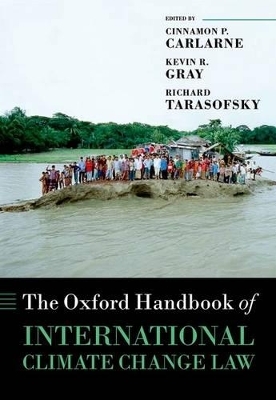
The Oxford Handbook of International Climate Change Law
Oxford University Press (Verlag)
978-0-19-968460-1 (ISBN)
Climate change presents one of the greatest challenges of our time, and has become one of the defining issues of the twenty-first century. The radical changes which both developed and developing countries will need to make, in economic and in legal terms, to respond to climate change are unprecedented. International law, including treaty regimes, institutions, and customary international law, needs to address the myriad challenges and consequences of climate change, including variations in the weather patterns, sea level rise, and the resulting migration of peoples.
The Oxford Handbook of International Climate Change Law provides an unprecedented and authoritative overview of all aspects of international climate change law as it currently stands, with guidance for how it should develop in the future. Over forty leading scholars and practitioners set out a comprehensive understanding of the legal issues that surround this vitally important but still emerging area of international law. This book addresses the major legal dimensions of the problems caused by climate change: not only in the content and nature of the international legal frameworks, which need implementation at the national level, but also the development of carbon trading systems as a means of reducing the costs of meeting emission reduction targets. After an introduction to the field, the Handbook assesses the relevant institutions, the key applicable principles of international law, the international mitigation regime and its consequences, and climate change litigation, before providing perspectives focused upon specific countries or regions.
The Handbook will be an invaluable resource for scholars, students, and practitioners of international climate change law. It provides readers with diverse perspectives, bringing together interpretations from different disciplines, countries, and cultures.
Cinnamon Piñon Carlarne is Professor of Law at Moritz College of Law at Ohio State University. Prior to joining the Moritz Faculty, she was an Assistant Professor at the University of South Carolina School of Law. From 2006-2008, Professor Carlarne was the Harold Woods Research Fellow in Environmental Law at Wadham College, Oxford, where she was a member of the law faculty and the Centre for Socio-Legal Studies. She previously taught at the University of Cincinnati Center for Environmental Studies. Prior to joining the University of Cincinnati, she was an associate attorney in the Energy, Land Use, and Environment section at Akin Gump Strauss Hauer & Feld in Washington, D.C. Her scholarship focuses on the evolution of system of domestic and international environmental governance. Kevin R. Gray is currently Counsel at the Trade Law Bureau, Government of Canada. He practices in the area of international trade law focussing primarily on WTO dispute settlement and free trade agreement negotiations. For over 15 years, Kevinâs work has examined the relationship between international trade obligations and environmental measures including those relating to climate change. He is currently a doctoral candidate at the University of Ottawa and has a Masters of Laws from the London School of Economics. He currently teaches at the University of Ottawa and Carleton University and has taught courses in international law and international economic law at the London School of Economics and the School of Oriental and African Studies. Richard G. Tarasofsky is a Canadian lawyer and diplomat, currently on posting at the Canadian Embassy to Germany. From 2009-2013, he headed the international environmental law section at Global Affairs Canada, where he was counsel on the Canadian delegation to the UN climate change negotiations. From 2007 2009, Mr. Tarasofsky was a counsel with the Government of Canadas Trade Law Bureau. Prior to becoming a public servant, Mr. Tarasofsky directed the Energy, Environment and Development Programme at Chatham House (2004-2007). From 1998- 2004, Mr. Tarasofsky was in private practice as specialising in international law relating to sustainable development. From 1993 1998, Mr. Tarasofsky was a Legal Officer at the Environmental Law Centre of the International Union of Conservation of Nature (IUCN).
PART I - INTRODUCTION; PART II - INSTITUTIONAL; PART III - CLIMATE CHANGE - PRINCIPLES AND EMERGING NORMS CONCEPTS IN INTERNATIONAL LAW; PART IV - SETTING UP THE INTERNATIONAL MITIGATION REGIME: CONTENTS AND CONSEQUENCES; PART V - CLIMATE CHANGE LITIGATION; PART VI - LIVING WITH CLIMATE CHANGE AND CLIMATE CHANGE ADAPTATION MEASURES; PART VII - REGIONAL AND COUNTRY-SPECIFIC PERSPECTIVES
| Erscheint lt. Verlag | 24.3.2016 |
|---|---|
| Reihe/Serie | Oxford Handbooks |
| Verlagsort | Oxford |
| Sprache | englisch |
| Maße | 171 x 246 mm |
| Gewicht | 1648 g |
| Themenwelt | Naturwissenschaften ► Biologie ► Ökologie / Naturschutz |
| Recht / Steuern ► EU / Internationales Recht | |
| Sozialwissenschaften ► Soziologie | |
| ISBN-10 | 0-19-968460-X / 019968460X |
| ISBN-13 | 978-0-19-968460-1 / 9780199684601 |
| Zustand | Neuware |
| Haben Sie eine Frage zum Produkt? |
aus dem Bereich


